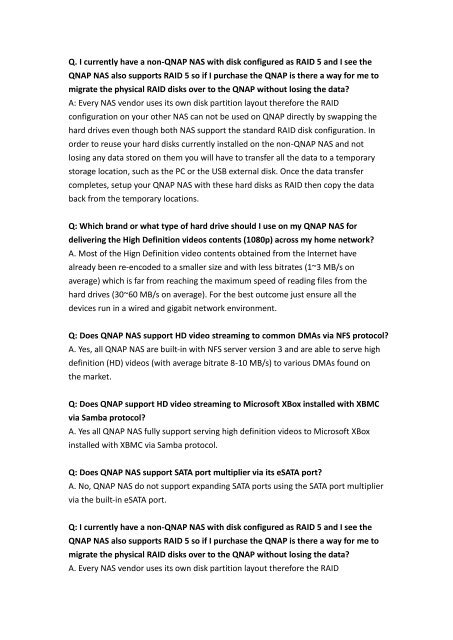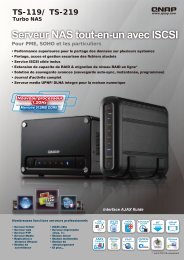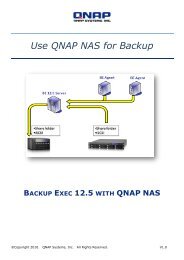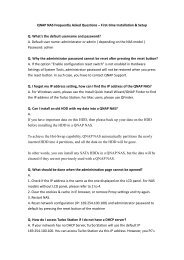QNAP NAS Frequently Asked Questions – Presales Q. What are the ...
QNAP NAS Frequently Asked Questions – Presales Q. What are the ...
QNAP NAS Frequently Asked Questions – Presales Q. What are the ...
You also want an ePaper? Increase the reach of your titles
YUMPU automatically turns print PDFs into web optimized ePapers that Google loves.
Q. I currently have a non-<strong>QNAP</strong> <strong>NAS</strong> with disk configured as RAID 5 and I see <strong>the</strong><br />
<strong>QNAP</strong> <strong>NAS</strong> also supports RAID 5 so if I purchase <strong>the</strong> <strong>QNAP</strong> is <strong>the</strong>re a way for me to<br />
migrate <strong>the</strong> physical RAID disks over to <strong>the</strong> <strong>QNAP</strong> without losing <strong>the</strong> data?<br />
A: Every <strong>NAS</strong> vendor uses its own disk partition layout <strong>the</strong>refore <strong>the</strong> RAID<br />
configuration on your o<strong>the</strong>r <strong>NAS</strong> can not be used on <strong>QNAP</strong> directly by swapping <strong>the</strong><br />
hard drives even though both <strong>NAS</strong> support <strong>the</strong> standard RAID disk configuration. In<br />
order to reuse your hard disks currently installed on <strong>the</strong> non-<strong>QNAP</strong> <strong>NAS</strong> and not<br />
losing any data stored on <strong>the</strong>m you will have to transfer all <strong>the</strong> data to a temporary<br />
storage location, such as <strong>the</strong> PC or <strong>the</strong> USB external disk. Once <strong>the</strong> data transfer<br />
completes, setup your <strong>QNAP</strong> <strong>NAS</strong> with <strong>the</strong>se hard disks as RAID <strong>the</strong>n copy <strong>the</strong> data<br />
back from <strong>the</strong> temporary locations.<br />
Q: Which brand or what type of hard drive should I use on my <strong>QNAP</strong> <strong>NAS</strong> for<br />
delivering <strong>the</strong> High Definition videos contents (1080p) across my home network?<br />
A. Most of <strong>the</strong> Hign Definition video contents obtained from <strong>the</strong> Internet have<br />
already been re-encoded to a smaller size and with less bitrates (1~3 MB/s on<br />
average) which is far from reaching <strong>the</strong> maximum speed of reading files from <strong>the</strong><br />
hard drives (30~60 MB/s on average). For <strong>the</strong> best outcome just ensure all <strong>the</strong><br />
devices run in a wired and gigabit network environment.<br />
Q: Does <strong>QNAP</strong> <strong>NAS</strong> support HD video streaming to common DMAs via NFS protocol?<br />
A. Yes, all <strong>QNAP</strong> <strong>NAS</strong> <strong>are</strong> built-in with NFS server version 3 and <strong>are</strong> able to serve high<br />
definition (HD) videos (with average bitrate 8-10 MB/s) to various DMAs found on<br />
<strong>the</strong> market.<br />
Q: Does <strong>QNAP</strong> support HD video streaming to Microsoft XBox installed with XBMC<br />
via Samba protocol?<br />
A. Yes all <strong>QNAP</strong> <strong>NAS</strong> fully support serving high definition videos to Microsoft XBox<br />
installed with XBMC via Samba protocol.<br />
Q: Does <strong>QNAP</strong> <strong>NAS</strong> support SATA port multiplier via its eSATA port?<br />
A. No, <strong>QNAP</strong> <strong>NAS</strong> do not support expanding SATA ports using <strong>the</strong> SATA port multiplier<br />
via <strong>the</strong> built-in eSATA port.<br />
Q: I currently have a non-<strong>QNAP</strong> <strong>NAS</strong> with disk configured as RAID 5 and I see <strong>the</strong><br />
<strong>QNAP</strong> <strong>NAS</strong> also supports RAID 5 so if I purchase <strong>the</strong> <strong>QNAP</strong> is <strong>the</strong>re a way for me to<br />
migrate <strong>the</strong> physical RAID disks over to <strong>the</strong> <strong>QNAP</strong> without losing <strong>the</strong> data?<br />
A. Every <strong>NAS</strong> vendor uses its own disk partition layout <strong>the</strong>refore <strong>the</strong> RAID






